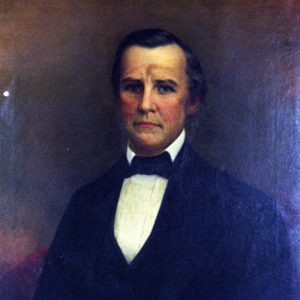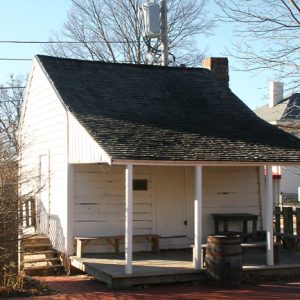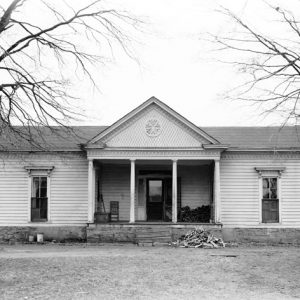calsfoundation@cals.org
Archibald Yell (1797?–1847)
Second Governor (1840–1844)
Archibald Yell, a larger than life and colorful figure in Arkansas history, was Arkansas’s first congressman, second governor, founder of Arkansas’s first Masonic lodge, and Mexican War hero. He was a consummate, magnetic politician. Yell County and Yellville (Marion County) were named for him.
Archibald Yell is believed to have been born in Jefferson County, Tennessee, in 1797, although North Carolina appears on his tombstone and Kentucky can be found in newspaper accounts. Yell himself wrote that he was born in Tennessee, although he could not spell that word or anything else above two syllables correctly. Best evidence indicates August 7, 1797, not 1799, as his date of birth. His parents—Moses and Jane Curry Yell—settled in the Duck River region of Tennessee. His father, a pirate captain, Revolutionary War soldier, and Southern planter, was also apparently a polygamist, with three wives in three different states and at least eight children. Archibald Yell received a very limited education. He allegedly participated in the First Creek War as a “boy captain” who raised his own company. However, there is no conclusive evidence supporting this claim. Yell did participate in the War of 1812 at the Battle of Pensacola on November 7–9, 1814. He carried the rank of sergeant and participated in the Battle of New Orleans on January 8, 1815, where he received a favorable notice from General Andrew Jackson. He then served as a first lieutenant in the First Seminole War (1817–1818).
Yell married the sixteen-year-old Mary Scott, a planter’s daughter, on November 8, 1821, in Tennessee. She died in childbirth in 1823, along with one of her twin daughters. Her maternal grandparents raised the surviving child, Mary Scott Yell. In 1827, Yell married another planter’s daughter, Ann Jordan Moore, with whom he had three daughters—Artemesia, Jane, and Elizabeth—and a son, DeWitt Clinton. Nancy, as his wife was called, thought Arkansas “a savage land” and died on October 7, 1835, seven months after her arrival in the state. Nine months later, in July of 1836, Yell took a third wife, the widow Mary Ficklin from Lawrence County, whose deceased husband, Judge Thomas Ficklin, had been an early political leader from Lawrence County. There were no children from this marriage.
It is uncertain just when Yell began to read law; uncertain, too, are the names of all the people with whom he studied. By 1827, Yell had settled in Shelbyville, Tennessee, and formed a law partnership with one of with his former teachers, William Gilchrist. Yell entered Tennessee politics in 1827, winning election to the state legislature by defeating a member of the Anti-Mason Party. Yell was already active in this fraternal body and, by 1830, was Grand Master of the Grand Lodge of Tennessee.
Yell was known as a violent man and engaged in several duels and brawls. His presence at an assault on newspaper editor James L. Armstrong and the consequent negative public reaction may have prompted Yell to move on. He was a close political friend of James Knox Polk, then a Tennessee congressman, and through Polk’s influence, President Andrew Jackson appointed Yell as the Receiver of Public Monies at Little Rock (Pulaski County) in 1831. On March 21, 1832, Yell was appointed Adjutant General of the Territorial Militia with the rank of colonel in place of Colonel Whorton Rector, who had resigned. His first Arkansas stay was cut short by malaria, causing him to return to Tennessee to recover in August 1832 and resign the office on December 12, 1832.
In 1835, he returned to Arkansas, having been appointed a territorial circuit judge. Yell soon gained a popular following, and stories of his courage and compassion were reported to historian John Hallum in the 1880s. Once during a trial, a prisoner made a break for freedom. “Run, damn it, run like hell!” was the judge’s non-judicial response. Another time, when an accused man refused to come into court, Yell himself sought the man out: “God damn you. Come into court and answer to your name and to the indictments against you!” The man meekly agreed. Yell was full, Hallum wrote, “of pleasant humor and sunshine, and magnetic in every presence,” but he was hard on gamblers.
Yell made his home in Fayetteville (Washington County), where, in 1835, he built a four-room Greek revival house, “Waxhaws,” that he had painted white. In building the house, Yell incorporated several Masonic symbols into the chimneys to reflect the three and seven steps of Masonry. Waxhaws was torn down in the 1970s, but in 1992, the Washington County Historical Society saved his law office, which also had been erected around 1835. In 1835, Yell helped form the first Masonic lodge in Arkansas. Washington Lodge 82 was at that time the westernmost lodge in the nation.
When Arkansas began drafting a state constitution in 1836, Yell, the leading Jacksonian Democrat of the Ozark upland, endorsed equal white male suffrage. Plantation area leaders favored a “three-fifths” system in which a slave would be counted as three-fifths of a voter for allotting state house and senate seats, thus giving the outnumbered planters more political power than the upland white farmers. Fearful of Yell’s popularity, the plantation-area leaders inserted a four-year residency requirement that, in Yell’s words, made him “ineligable” to be governor. Yell instead was prevailed upon to run for Congress, defeating an anti-Andrew Jackson/Martin Van Buren man, William Cummins. Yell arrived in Washington DC in the fall of 1836 at the end of the session of the twenty-fourth Congress. When President Martin Van Buren called a special session in May 1837, Yell was forced to run again, although he had no organized opposition; he and other state leaders thought that his original election also covered the twenty-fifth Congress, but this was not the case. His opponent that fall was Batesville (Independence County) Whig John Ringgold, a supporter of the Bank of the United States that Jackson had killed off. Yell won a convincing three-to-two victory and took his seat in the twenty-sixth Congress. Although Yell could not spell, his speeches were well received in Washington, and his attack on a bill to tear down the new treasury building because it blocked a view of the White House was humorously sarcastic. For Arkansas, he brought home appropriations for roads and river improvements.
Following the death of his third wife in 1838, Yell did not seek reelection to Congress and was succeeded by Edward Cross. The next year, he began campaigning for governor, having finally met the residency requirements. Given Yell’s enormous popularity, the Whigs did not even bother to field a candidate in the 1840 election. Yell, who had supported Jackson in the destruction of the Bank of the United States, was now faced with the consequences of having no national institution able to ride herd of wild-cat state banking. Both the state-owned State Bank and the privately owned but publicly funded Real Estate Bank were in the process of collapsing as the national depression known as the Panic of 1837 deepened, and though he tried, Yell failed to get state control over the banks’ liquidation. While governor, he supported public schools and the abolition of imprisonment for debt but vetoed a married women’s property rights bill and refused on the grounds of economy to appoint a state geologist. He did, however, sign the Arkansas State Donation Law of 1840 in order to encourage settlement into the state.
Yell resigned his gubernatorial seat in the spring of 1844 for reasons unknown. His retirement proved to be short-lived when the Whigs nominated the popular Fayetteville lawyer, David Walker, as their candidate for Congress. Although Walker was Yell’s law partner, and Yell was not anxious to make the run, he entered the fray, possibly inspired by the dark-horse nomination of Yell’s longtime friend, James Knox Polk, for the presidency on the Democratic national ticket. The Walker/Yell canvass was long remembered. Yell charmed the voters and ignored the issues, displaying his charismatic character to the fullest. One story has it that Yell bought a chance at a shooting match for beef and made the best shot. He then gave his prize of beef to a poor widow and bought drinks for everyone. On another occasion, they came upon a camp meeting on the Kings River. Yell headed straight for the “amen corner,” where the faithful gathered to cheer on the undecided. Yell then led in singing the hymn “How Happy Are They Who the Savior Obey.” He easily defeated the dignified and reserved Walker.
Before the session began in 1845, incoming president Polk tapped Yell to bring Texas into alignment with a joint resolution annexing the Lone Star republic to the United States. This mission he successfully completed, and a Texas convention approved the annexation, thus setting the stage for the war with Mexico.
Yell was back in the twenty-ninth Congress at the onset of the Mexican War in 1846, but with Polk’s call for troops, he returned to Arkansas to enroll as a private in Captain Solon Borland’s company of Arkansas volunteers. The private rose to command the Arkansas Mounted Volunteers when, at the mustering in, he was elected regimental colonel. At the same time, Yell attempted to keep his House seat and also indicated he wanted elevation to the U.S. Senate. Within the Democratic Party in Arkansas, both the “Family” members—as the Conway-Sevier-Johnson alliance was called—and the outsider faction led by Chester Ashley and William E. Woodruff saw an opportunity to embarrass Yell. A hostile legislature forced him to resign his congressional seat on July 1, 1846, and the Senate seat went to Chester Ashley.
Yell’s troubles continued. Unwilling or unable to establish discipline over what was soon called the “Mounted Devils,” Yell quarreled with Regular Army General John E. Wool, who, because of the “promiscuous defecation” by the Arkansas soldiers, invariably assigned the Arkansas regiment the worst camping sites. With his former ally Borland as well as Whig captain Albert Pike reporting every discipline episode—as well as murder, rape, and looting against civilians—back to Arkansas newspapers, Yell’s reputation suffered. As Wool reported to Taylor, the Arkansas troops were “wholly without instruction and Colonel Yell is determined to leave them in that condition.”
General Wool’s contingent eventually went to reinforce General Zachary Taylor, who was at the hacienda Buena Vista. The large Mexican army, commanded by Antonio Lopez de Santa Anna, demanded that Taylor surrender and, when he refused on February 23, 1847, launched attacks on several fronts. The Arkansas troops did not fight as one unit. Captain Albert Pike’s command was on the left side of the fields, and only part of those on the right were mounted when a brigade of Mexican lancers attacked the rear of the American position near the hacienda. Some Arkansans ran away, but Yell, with about a thousand Mexicans in front of him, led a charge forward with his sword in hand, apparently killing several Mexicans until brought down by multiple lance wounds. The heroic charge secured the American rear in what came to be considered one of the greatest victories won by an American army.
Despite his heroic death, his leadership remained controversial. Albert Pike’s report on the battle, which included information he had not personally witnessed, resulted in such animosity within the regiment that, upon returning to Arkansas, Yell’s successor, John Selden Roane, fought a bloodless duel with Albert Pike in Indian Territory.
First buried near the battlefield at Saltillo in a tin coffin encasing the wood, Yell’s body remained there only five months until it was brought back to Arkansas and buried in the family cemetery at Waxhaws. Finally, all the bodies from this cemetery were removed by the Masonic lodge and reburied in the Evergreen Cemetery in Fayetteville in 1874. (Some sources say 1872.) The information found with Yell’s grave in Evergreen Cemetery contains numerous factual errors. In 2019, the crumbling tombstone was replaced with a new obelisk that reproduced the information on the original stone.
Yell was survived by his daughters and the one son. DeWitt Clinton became a Fayetteville lawyer but died just before the Civil War. A nephew, James Yell, was an active politician before the Civil War and served the Arkansas Army early in the Civil War.
Yell has customarily been seen as the epitome of a Jacksonian Democrat in Arkansas politics. Like “Old Hickory,” “Archy” was a larger than life individual given to many inconsistencies. As a land speculator, he purchased Mississippi River lands with federal judge Benjamin Johnson and David Walker. He invested in Red River lands with friend and future president James Knox Polk and engaged in local speculations, notably the Franklin County town of Ozark, with William Haile and Yell’s law colleague and political opponent David Walker. As a politician, however, he denounced speculators and opposed bankers, although he owned shares in the Real Estate Bank. At the time of his death, he was disillusioned with Arkansas and hoped for an appointment as territorial governor of California. In death, he became an icon, and writer Charles Morrow Wilson, in A Man’s Reach (1944), turned him into a fictional character.
For additional information:
Burnett, Abby. “The Three Burials of Archibald Yell.” Flashback 69 (Summer 2019): 57–66.
Hallum, John. Biographical and Pictorial History of Arkansas. Albany, NY: Weed, Parsons and Co., 1887.
Hughes, William. Archibald Yell: An American Hero. Fayetteville: University of Arkansas Press, 1988.
Meek, Melinda. “The Life of Archibald Yell.” Arkansas Historical Quarterly 26 (Spring–Winter 1967): 11–23, 162–184, 353–378.
Wilson, Charles Morrow. A Man’s Reach. New York: H. Holt & Co., 1944.
Michael B. Dougan
Jonesboro, Arkansas
This entry, originally published in Arkansas Biography: A Collection of Notable Lives, appears in the CALS Encyclopedia of Arkansas in an altered form. Arkansas Biography is available from the University of Arkansas Press.









The three daughters were raised by Gen. William Moore in Tennessee (after Yell’s death). DeWitt was in college when his father died (looked after by President Polk). I left a clip at the Moore (Find A Grave) memorial about the children (Fayetteville Observer, August 11, 1870, Tennessee).